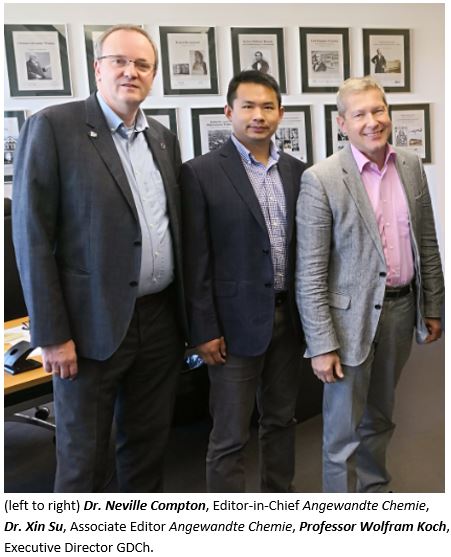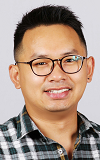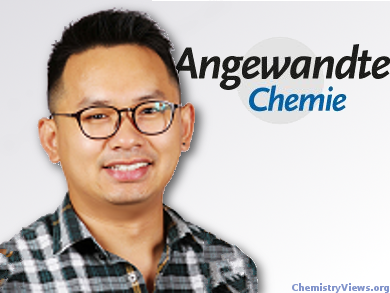Dr. Xin Su is Editorial Manager and first Editor of Angewandte Chemie based in Shanghai, China. Angewandte is the flagship journal of the GDCh (German Chemical Society) and one of the most renowned chemistry journals in the world. It is the first time that there is an Angewandte editor based outside of Germany.
Here Xin Su talks to Dr. Vera Koester for ChemViews Magazine about his interest in publishing, as well as the Angewandte Chemie and China.
What got you interested in publishing?
Interestingly, my curiosity about publishing originated from my first encounter with Wiley. When I was in my junior year in college, Dr. Brian Johnson, the then editor of Chemistry – An Asian Journal—now managing editor of The Chemical Record as well as a colleague of mine—came to my department and did a workshop on publishing. That was the first time I learned that there are actually jobs in scholarly publishing for Ph.D.s, especially as professional peer review editors.
While I’ve always considered scholarly publishing a key component in shaping the future of scientific research, that very experience probably first seeded the idea of finding a job as an editor in my mind.
Tell us a bit about how your career has developed, please.
I’m quite into scientific journalism even though to this day I still consider myself an amateur scientific journalist. In my graduate school and postdoc days, I wrote many pieces, mainly short highlights, for ACS Noteworthy Chemistry (later known as ACS Cutting-Edge Chemistry and unfortunately now defunct), JACS Spotlights, and, of course, most fittingly ChemViews Magazine. The most important thing my writing experience has taught me is how to appreciate the work of others, a critical ability a successful editor should have, I think.
In 2015, I started at Wiley as an associate editor for its materials science journals. Peer review editing was my main responsibility, and I continued writing research highlights for ChemViews Magazine and MaterialsViews (now Advanced Science News). I felt lucky that I had opportunities to learn directly from some of the most experienced editors, and with their help, I also undertook new projects such as special issues and video highlights. The latter has since developed as a new product called video abstracts.
After spending two years with materials science journals, I switched to Nature Chemistry. Although it is also edited by a team of in-house editors, Nature Chemistry works quite differently in many aspects from the Wiley in-house journals. I’ve actually learned a lot from these differences and I think my experience with it really gave me a whole new perspective to understand publishing. I also liked the fact that I was able to reconnect with the chemistry community where I used to belong.
What do you enjoy most about your job?
I quite enjoy the fact that I can read some of the most exciting results well before many others, which in my opinion is quite a privilege of being an editor. However, my favorite part of the job is that by working together with authors and reviewers, I can help better communicate new scientific findings to the chemistry community and the general public. The sense of involvement in advancing science is quite rewarding to me, and certainly, it’s a big motivation for me.
Is working in the Shanghai office different from your previous experiences?
In a way it really isn’t because coming back to Wiley was just a matter of moving across the Huangpu River from Nature’s Shanghai office to Wiley’s. But unlike Wiley’s materials science in-house journals and Nature’s research journals, both of which have a well established editorial presence in China, we have just started to build a chemistry editorial team for Angewandte Chemie, the ChemPubSoc Europe Journals, and the ACES journals even though the individual journals are well known. This also means that our new chemistry team will be doing a lot of outreach to strengthen the connections with chemists in China.
The research output from China is huge and still increasing at an incredible rate, especially in chemistry, so it’s also important to be proactive in finding new opportunities to collaborate with Chinese researchers to promote their work as well as our journals and the societies that own them. Modern technology allows me to be in regular contact with my colleagues based in Germany so that we can ensure that Angewandte runs smoothly.

What was the biggest surprise for you?
It really surprises me that many of our authors and readers are not aware of the society ownership of and involvement in our journals. Sometimes being considered working for a pure commercial publisher doesn’t make it easy for you. However, what many people don’t realize is that Wiley is the largest society publisher in the world and we serve and work with many professional societies, and, therefore, the researchers affiliated with them.
This is particularly true for our chemistry journals, for example, Angewandte Chemie is 100 % owned by the GDCh, the Germany Chemical Society, and it was great to have the opportunity to visit the GDCh headquarter in Frankfurt and meet the Executive Director Wolfram Koch and his team during my recent visit to the Angewandte Offices in Germany.
Similarly, Chemistry – A European Journal is fully owned by ChemPubSoc Europe and many other sister journals are co-owned by ChemPubSoc Europe and Wiley-VCH or by ACES and Wiley-VCH. This is something we need to send a clear message about to the community and raise the awareness, and it takes time to change such a stereotypical perception.
What do you do in your spare time?
I’m an avid letterpress printer and I’ve done lots of printing over the years so you can say that I was practicing publishing before even entering publishing. So far, I’ve printed on presses at the Baker Library of Dartmouth College, Hanover, NH, USA, the Bodleians Libraries of Oxford University, UK, and most recently and most importantly, the Gutenberg Museum in Mainz, Germany—the last felt like a pilgrimage for a letterpress enthusiast and someone who works in the publishing industry. Some of my prints went on exhibition at the University of Otago in New Zealand, a country even I’m still yet to go to.
I used to fence épée as a competitive member of the US Fencing Association but now whenever I find the time I will do it for fun.
Thank you for the interview
 Xin Su received his B.Sc. in chemistry from Nankai University, China, in 2009. He then moved to the USA and conducted graduate research on hydrazone-based molecular switches and functional materials at Dartmouth College, Hanover, NH, USA, where he received his Ph.D. in organic chemistry in 2013. Following postdoctoral training at the National Energy Technology Laboratory (NETL), Pittsburgh, PA, USA, he worked as an associate editor for Wiley’s materials science journals including Advanced Materials in Hoboken, NJ, USA, from 2015 to 2017.
Xin Su received his B.Sc. in chemistry from Nankai University, China, in 2009. He then moved to the USA and conducted graduate research on hydrazone-based molecular switches and functional materials at Dartmouth College, Hanover, NH, USA, where he received his Ph.D. in organic chemistry in 2013. Following postdoctoral training at the National Energy Technology Laboratory (NETL), Pittsburgh, PA, USA, he worked as an associate editor for Wiley’s materials science journals including Advanced Materials in Hoboken, NJ, USA, from 2015 to 2017.
After spending a year at SpringerNature as a senior editor of Nature Chemistry in Shanghai, China, Xin joined the editorial team of Angewandte Chemie in 2018.
Selected Awards
- Fellow of Deutsche Forschungsgemeinschaft (DFG) at 65th Lindau Nobel Laureate Meeting, Council for the Lindau Nobel Laureate Meetings/Foundation Lindau Nobel Laureate Meetings (2015)
- Early Career Fellowship, Society for Scholarly Publishing (2015)
- Chinese Government Award for Outstanding Students Abroad, Ministry of Education of P.R. China (2014)
- Letterpress Printing Award, Dartmouth Book Arts Program, Dartmouth College (2010)
Selected Publications
- X. Su, TF Robbins, I. Aprahamian, Switching through Coordination‐Coupled Proton Transfer, Angew. Chem. 2011, 123 (8), 1881–1884. https://doi.org/10.1002/ange.201006982
- Y. Yang, X. Su, C.N. Carroll, I. Aprahamian, Aggregation-induced emission in BF 2–hydrazone (BODIHY) complexes, Chem. Sci. 2012, 3 (2), 610–613. https://doi.org/10.1039/C1SC00658D
- X. Su, M. Lõkov, A. Kütt, I. Leito, I. Aprahamian, Unusual para-substituent effects on the intramolecular hydrogen-bond in hydrazone-based switches, Chem. Communic. 2012, 48 (85), 10490–10492. https://doi.org/10.1039/C2CC35860C
- X. Su, I. Aprahamian, Zinc (II)-regulation of hydrazone switch isomerization kinetics, Org. Lett. 2013, 15 (23), 5952—5955. https.//doi.org/10.1021/ol402789y
- M. L. Croteau, X. Su, D. E. Wilcox, I. Aprahamian, Metal Coordination and Isomerization of a Hydrazone Switch, ChemPlusChem 2014, 79 (8), 1214–1224. https://doi.org/10.1002/cplu.201402134
- V. Carboni, X. Su, H. Qian, I. Aprahamian, A. Credi, Blue‐Light‐Emitting Triazolopyridinium and Triazoloquinolinium Salts, ChemPhotoChem 2017,1 (5), 222–229. https://doi.org/10.1002/cptc.201600048
Also of Interest
- Chemists Are Increasingly Willing to Try New Things,
Christian Remenyi, Neville Compton,
ChemViews Mag. 2018.
https://doi.org/10.1002/chemv.201800108
Interview with Neville Compton, Editor-in-Chief of Angewandte Chemie




